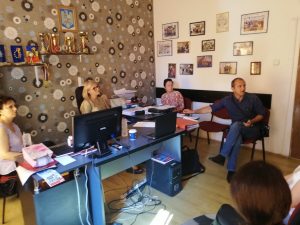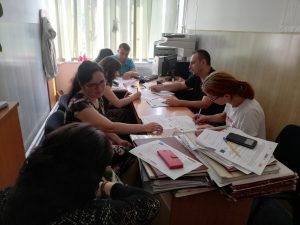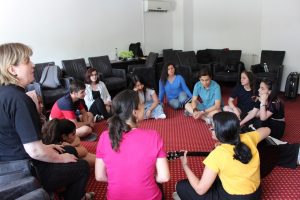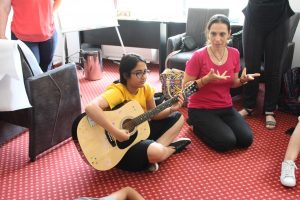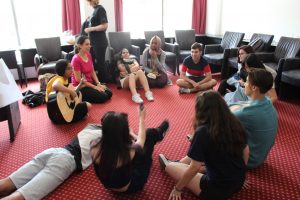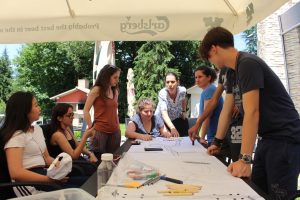Children in conflict with the law are still children and need protection and support for reintegration and rehabilitation. This is the vision of the European Project AWAY (1) implemented in Romania by the Foundation Terre des hommes.
Within the project a survey has been carried out analysing both the institutional structure and the legislation that regulates the juvenile justice system as well as the practices identified in the system. The study, conducted by Prof.Dr. Durnescu and Corina Popa present a critical perspective on the juvenile justice system in Romania, with a special focus on diversion measures.
The authors took into consideration the European Union and UN standards and studied the extent to which Romanian legislation, institutions and practices comply with these standards.
The most important principles pursued in the field of juvenile justice are similar to all the principles applicable to the field of child protection and the most important of them is that in all state interventions, the best interests of the child will be observed. Starting from this, rehabilitation and reintegration of juveniles in conflict with the law are measures that respond to the best interests of the child.
The juvenile who has reached the age of 16 is criminally liable. In the case of the juvenile who is criminally liable, it is possible to take a custodial or non-custodial educational measure. When choosing the educational measure, account is taken of the degree of social danger of the deed, the physical condition, the intellectual and moral development, his/her behaviour, the conditions in which the child has been raised and in which it has lived and any other elements capable of characterising the underage child.
In the case of juvenile criminally liable juveniles, the provisions of the Criminal Procedure Code and the Criminal Code shall apply.
Once the minor arrives in front of the prosecutor, the prosecutor has a number of options depending on the nature of the deed, the manner of its commission, the degree of danger. He/she may abandon the prosecution, this being the first alternative measure to indictment, the first diversion measure, or the case is sent to court, and custodial or non-custodial educational measures are proposed. From this perspective, Romanian legislation is more progressive than others, because it no longer provides for the measure of detention.
The educational measures applicable to the criminally responsible uderage children are non-custodial measures (such as civic apprenticeship, supervision, weekend confinement, daily assistance. Such measures may be accompanied by obligations – not to attend certain places, not to meet certain persons, to follow a certain program) or custodial measures (admission to an educational centre or detention centre).
The educational activities focus on re-educating the minor (as a preventive measure) by appropriate means and his/her reintegration into the family and society. The results of these measures cannot be achieved without family support and therefore one of the recommendations of the survey ” Alternative Diversion Methods for the Juveniles in Romania” is that the link with the family should be one of the priorities of the specialists involved in the reintegration process of minors in conflict with the law.
In the case of the criminally responsible juveniles, the institutions involved are: the police, the prosecutor’s office, the courts of law (in Romania there is one Tribunal for Minors and Families in Brasov), 41 probation services on the national level, 2 educational centres (Buziaş and Târgu Ocna – with around 180 places each) and 2 detention centres (Craiova and Tichileşti – with about 150 places each).
It is important to know that juveniles have procedural guarantees and enjoy a special regime – they have free legal assistance, sessions are not public, participation of a representative of DGASPC at sessions is mandatory, they benefit from the halving of punishment limits and from the non-registration criminal record.
An integrated mechanism of communication and cooperation between all institutions working with juveniles in conflict with the law must be created. A holistic approach that puts the family at the core of attention as a social system should be the dominant theoretical model for these institutions, while the rights of the child and the superior interest of children should remain the basic principles of juvenile justice.
(1)The Project AWAY – „Alternative Ways to Address Youth” seeks to increase public awareness of alternative diversion methods when it comes to dealing with the criminal trial and process and to increase the level of information on the procedural safeguards of EU Directives 2016/800, 2012/13, 2012/29 applicable to minors in conflict with the law.
AWAY is coordinated by the Regional Office for Central and South-Eastern Europe of the Terre des hommes Foundation and implemented by organisations in Europe that are focused on juvenile justice. The project is supported by the European Union’s Rights, Equality and Citizenship Programme and is active in five countries across Europe: Bulgaria, through the involvement of the Judicial System Development Program (PDSJ), Croatia through Brave Phone Croatia, Romania through Terre des Hommes-Switzerland , Belgium, through Defence for Children International (DCI) and the International Juvenile Justice Observatory (IJJO), Hungary, under the coordination of the Terre des hommes Regional Office for Central and Southeast Europe (Applicant) and the Global Network for Public Interest Law – PILNET.
![]() This project was funded by the European Union’s Rights, Equality and Citizenship Programme (2014-2020
This project was funded by the European Union’s Rights, Equality and Citizenship Programme (2014-2020
